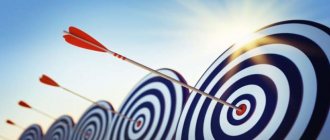What does self-knowledge mean?
Self-knowledge is understanding oneself, studying one’s psychological, biological, social and spiritual characteristics.
Self-knowledge begins in infancy, when the child begins to recognize himself as an individual person, and continues throughout our lives.
In simple terms, a person’s knowledge of himself is the study of:
- your strengths and weaknesses;
- fears;
- desires;
- interests;
- attachments;
- inclinations;
- hopes;
- ability to communicate;
- attitudes towards life and people;
- values;
- attitude towards criticism;
- life satisfaction, etc.
Online program "Self-knowledge"
In this program, in just 4 weeks, with the help of psychological tests and exercises, you will find out what you really want in life, understand your strengths and weaknesses, realize the characteristics of your internal motivation and thinking, learn to use the characteristics of your character, determine your values, creative and professional predispositions that will help you find a job you like; you will understand how to demonstrate your leadership and team qualities not only at work and in business, but also in family and relationships. In addition to all the knowledge gained, you will receive recommendations for practical use in life. Find out more...
Self-knowledge is the road to a life that has no regrets and can be lived with pleasure again. Start it immediately, and then there will be many more happy days in your life!
We also recommend reading:
- Storytelling
- Diary as a universal way of self-knowledge and success
- Exercises for self-knowledge
- Effective methods of self-knowledge
- Rules and secrets of self-education
- Practical benefits of self-knowledge
- Secrets of inventors: a selection of useful materials
- “What is in your character?”
- Self-knowledge: how to understand and use your character traits
- MAC therapy: the first step on the path to yourself
- Conditions for character formation
Key words:1Self-knowledge
Why is it so difficult to know yourself?
There are several reasons:
- Lack of time. We live at a frantic pace, rack our brains over how to combine work and family, chase earnings, experience stress and have trouble sleeping. In this way of life, the idea of self-knowledge seems sheer nonsense. In our daily time pressure, we sometimes have no time to sit in silence and drink a cup of tea. What kind of knowledge can we talk about there? By the way, I recommend reading our article on how to deal with stress, and also familiarize yourself with a selection of books to improve the quality of your sleep.
- Focus on the external. We are more in need of external success, promotion, status, influence, material goods and underestimate the importance of satisfying our internal hunger. However, achieving success is very closely related to self-analysis. If you don't pay attention to what's inside, you can get devastated even when you reach decent heights.
- Reluctance to face the truth. We all sometimes commit unpleasant acts, utter hurtful words, and behave unworthily. If you start delving into your personality, you can find a lot of negative things there. Who likes to learn this about themselves? It’s much easier not to notice and not interfere with the comfortable perception of your loved one. Otherwise, we will have to change something and destroy the world to which we are so accustomed.
- Lack of awareness of actions. We do many things in our lives unconsciously. Since it is difficult for the brain to concentrate on all the actions in each moment, all the feelings and emotions, it takes the path of least resistance and turns on autopilot.
- Identifying yourself with your thoughts. Possessing pronounced critical thinking, a person forgets that he is a combination of mind, feelings and body. With such a limited way of exploring oneself, it is extremely difficult to achieve self-knowledge.
- Guide only by feelings. This assumes the opposite situation to the previous point, when a person follows momentary feelings, not taking into account the fact that the assessment of reality can be distorted due to various factors.
What does a lack of self-knowledge lead to?
According to British author and best-selling English-language novelist Alain De Botton, “a lack of self-knowledge leaves us open to chance and misguided ambition.”
What else does a lack of self-knowledge entail:
- Low self-esteem and anxiety. If a person does not have a clear idea of what he is, what advantages he has and what kind of potential lies within him, when assessing himself he will be guided by the opinions of others, and as we know, they are not always flattering.
- Difficult relationships with others. We are talking about both personal life, relationships with loved ones, and social connections with colleagues, friends, and outsiders. A person who does not know what he loves and what he wants will invariably enter into toxic relationships, endure other people's complaints, rudeness, neglect and other negativity.
- Least favorite job. When choosing a profession, we are often guided by the wishes of our parents or social recognition. A person who knows and values himself and his time will strive to find something he enjoys that promotes development and success. You can read how to find your purpose in our separate publication.
- Throwing money down the drain. In this case, finances are wasted on things that do not bring true pleasure, but are purchased for the sake of fashion. And so every time. Moreover, not only money is spent in this way, but also time.
How does self-knowledge occur?
From childhood, a person tries not only to understand the world, but also to study his abilities. The individual tries to understand what he knows, what he is capable of and what he can do at this stage of life. Based on this, the choice of profession and life position is made.
Main stages
The main points along this path include the following points:
- determining one’s biological needs and personal characteristics, considering oneself as an element of nature;
- own identification as a particle of society;
- exploring your own abilities and finding ways to use them.
Knowledge of the world and self-knowledge
Tools for self-knowledge
Tools such as:
- keeping a self-observation diary;
- studying the psychology of individual development;
- psychological trainings in personal growth groups and auto-trainings;
- reading books and watching films, considering artistic images of people and their actions and comparing them with their positions;
- consultations with a psychoanalyst and passing psychological tests.
Carefully. Self-knowledge has nothing to do with “soul-searching” and should be objective and not overtly critical.
Man is a unique creature. No two people are the same, and you can’t measure everyone with the same yardstick. Self-knowledge can go in different ways: through self-actualization, religion, spiritual practices and teachings. The important thing is that as a result of this path a person can try to find himself, understand the meaning of life and realize himself in it.
What does self-knowledge give?
What does a person look like who is not afraid to get to know himself and look at his personality soberly and honestly:
- He does not shift responsibility for his failures in relationships and career onto other people, but tries to understand the situation and solve it in the most environmentally friendly way.
- He has healthy self-esteem, which allows him not to become discouraged when faced with criticism, competition, loss, etc.
- He becomes more aware, uses autopilot less and begins to notice the smallest changes.
- He stops blaming himself and others for his bad mood.
- He treats money adequately: he does not waste it, but directs it to what is really important to him.
- He gets used to hearing and listening to himself, his body, and resting when it is truly necessary. Such a person treats himself with care, love and understanding.
- Sensitivity to the world and the people around you awakens, mutual understanding grows.
- He is able to make positive changes in his life because he understands how people hold themselves back and for what reasons.
- When making a choice, he relies only on himself.
- A person understands his uniqueness and the possession of an exceptional set of qualities necessary for development.
- Becomes more harmonious and happy.
Ways to know yourself
Let's move from theory to practice and find out with what methods and tools you can dive deeper into your personality, get to know yourself better and find harmony.
1. Slowdown
It is logical that with our rhythm of life it is extremely difficult to engage in self-knowledge. Start by slowing down and taking time for yourself. There are 24 hours in a day and, believe me, if you use them wisely, you can find time for anything.
I recommend reading about time management techniques that will help you manage your life more productively.
The right questions
Two main questions that are important to regularly ask yourself:
- What's going on in my life right now?
- How okay am I with this?
It is better to record the answers that pop up in your head on paper point by point. For a more comprehensive understanding, it is better to take several areas of life at once and go through each of them. Ask yourself: “What is happening now with my personal life, professional fulfillment, health, finances, creative self-expression?”
If distortions that create discomfort have been identified in some areas, you should move to the next stage and find out the reasons, possible methods of correction, or even the validity of personal claims to this or that area of life.
What other questions will help you get to know yourself better:
- How am I feeling at the moment?
- Who am I? Who do I consider myself to be, what place do I occupy in society, at work, in the family?
- What is my life goal and values, where am I going?
- Do I have any grudges against my parents and if so, what is the reason?
- What kind of people do I like and dislike?
- What actions and achievements am I proud of?
- In what situations did I act incorrectly and could this have been avoided?
- What things in life do I consider the most important? How much time do I devote to them?
- What purchases do I often make based on advertising or trends that end up not making me happy?
- What addictions are dragging me down? Am I ready to correct them?
- What negative traits of my character would I not want to demonstrate to people dear to me and those around me?
- What's making me jealous lately?
- What prevents me from making decisions and making my life better?
Even more questions that reveal your personality can be found in self-discovery tests.
Self-observation and self-analysis
Simply observing your behavior, internal sensations, emotions, reactions to certain words and events will help you get to know yourself. Such observation must certainly be followed by self-analysis, which will help confirm or refute your own conclusions, find out the reasons and think about improving the situation.
Let me give you an example. Observing himself, a person realizes that he is overly shy. Through introspection, it is possible to confirm this fact: it can be difficult to get comfortable in the company of strangers, it is difficult to express your point of view, there is a desire to remain silent, sit out, when you try to say something, your throat dries up, your face turns red.
After this, an assessment is made: whether attacks of embarrassment always occur or only in specific situations and under certain conditions. Next, the person looks for ways to cope with his shyness, performs various techniques, practices, signs up for trainings, etc.
By the way, I advise you to read our article on how to get rid of complexes.
Mindfulness
Control over one's actions, thoughts and feelings makes a person truly the master of his destiny.
The Indian philosopher Osho in his book “Mindfulness” described the practice of being in the “here and now” state. He believes that the most important skill to learn is observation. Here are the recommendations he gives:
- Watch every action you take, every thought that passes through your mind, every desire that comes over you.
- Watch what and how you say, what gestures you use, how you walk and even brush your teeth and take a bath.
- Do not eat mechanically, stuffing your mouth with food, chew with observation, with feeling. Otherwise, even the most delicious food will seem bland and will not bring satisfaction.
- Watch. This way you will understand how much you have missed so far.
Psychological work
It consists of reading books on psychology and socionics, passing psychological tests, identifying one’s own psychotype, chronotype, etc.
There are many classifications of human personality types: according to Holland, according to Jung, according to temperament, perception, etc.
Here, for example, is what the socionic division of personality types looks like (see picture below).
Application of various techniques
I will give an example of the simplest and safest technique of self-knowledge, which is based on art therapy and psychological work with subpersonalities.
The practice takes place in two stages:
- Thoughtful. Close your eyes and imagine yourself in the future. The term can be any – 1 month, 5–10 years. Pay attention to how you look, what you have, what you don’t have, whether you are happy, how you feel, what you do, who you live with, who you are close to, etc.
- Expression in a drawing. Now transfer the presented image onto paper. Don't chase technique. The main thing is to be creative, choose colors and shapes.
The point of this technique is to correlate the image that was created in the imagination with what is now in reality. This will give you the opportunity to understand what is in the future and what is missing at the moment, what you would like to get or, conversely, what to get rid of.
If the future seems vague and uncomfortable, it is worth thinking about the psychological blocks that, even at the level of imagination, do not allow you to see yourself as joyful and harmonious. In this case, the block can also be represented in the form of a drawing, thinking about what color, size, shape it might have, what it looks like, what it serves, etc.
You might be interested in reading about how to get out of depression.
Esoteric systems
Anyone who does not consider himself an inveterate skeptic can use various esoteric tools that allow him to look deeper into his inner world. These include:
- astrology;
- human design (Human Design);
- tarot cards;
- numerology;
- meditation;
- yoga;
- qigong;
- space energy;
- Reiki energy;
- channeling.
There are actually a lot of such techniques. At the same time, it is not at all necessary to rush to extremes and begin to comprehend everything at once. There may be something for everyone. For example, I have been doing yoga with a trainer for several years, I like meditation, and I am also interested in numerology, Tarot and Human Design. Perhaps you too can reveal new facets of your personality with the help of one of these tools.
I recommend taking spiritual development courses. You will get to know yourself better, unlock your potential and be able to achieve inner harmony.
Know yourself!
I would like to remind you of a statement concerning specifically the self-government of the individual, where the Almighty promises punishment to sinners for forgetting the Lord ﷻ, consigning themselves to oblivion, and not properly knowing their essence. The Creator ﷻ addresses Muslims (meaning): “Do not be like those who forgot Allah ﷻ and whom He made forget themselves. They are the wicked” (Surah “Assembly”, verse 19).
The Messenger of Allah ﷺ called believers to know themselves, so that through self-knowledge they could become highly moral people and achieve the required spiritual heights. He always reminded them that oblivion of one’s own soul will bring nothing to a person except misfortune and troubles. He taught that until a person goes through the stage of self-knowledge, he will not be able to achieve significant spiritual victories.
The famous saying of the Prophet Muhammad ﷺ says: “He who knows himself, knows his Lord . The same hadith is transmitted from the prophet Idris (peace be upon him): “He who knows the creation knows the Creator. He who has known blessings has known the Benefactor. He who knows himself knows his Lord .
Many sages and great teachers throughout time have pointed out the importance of self-government. Let us recall some of their statements. Socrates advised: “Know yourself . Seneca, “Live forever and learn how to live . William James wrote: “The greatest discovery of my generation is that a man can change his life by changing the way he thinks about things . Joseph Edison said, “The hardest thing for a powerful mind to control is itself,” etc.
Know yourself! Very well said, isn't it? These words contain a deep philosophical thought! This covenant is a kind of instruction for the constant exploration of one’s own life and being, which is the essence of truth, life wisdom, philosophy, any change for the better and, finally, real success. Let this covenant become the motto of your life!
It is no coincidence that we consider self-government through the prism of the greatest sayings of the Prophet Muhammad ﷺ, Prophet Idris (peace be upon him) and the scholars of Islam, as well as Socrates and other thinkers, since there is a close relationship between them. Moreover, the relevance of their reasoning in modern conditions is of particular importance, and since then little has changed in man's approaches to himself.
Many people know Socrates’ confession: “I know that I know nothing!” , and then his call: “Know yourself!” Self-knowledge for Socrates was synonymous with the expression “know your feelings, your inner motivation.” And for a scientist, motivation was equivalent to such virtues as love of truth, justice, courage, discipline and honesty. He was and remains the most shining example of honesty in thought and deed.
Turning to the history of self-government, we will find that people have always looked for various methods of improving it. We cannot dwell in detail on the variety of methods that go back centuries. Let us recall just a few of them.
As you know, even in the ancient world, scientists were interested in this problem, and at the same time, shamanism arose. A special contribution to the study of self-government belongs to such ancient eastern states as China and India, where concepts different from magic and shamanism began to emerge. Among them are such diverse and popular trends as yoga, Buddhism, as well as many different schools (Wushu, Qigong or Sufism). In addition, there are still various religious methods of self-government that are used in the form of prayer, repentance, fasting, etc. The modern method includes autogenic training. Schools of humanistic psychoanalysis and neurolinguistic programming also emerged, called new wave psychoanalysis. But all these forms of self-government are constantly being improved, and man is also improving along with them.
The school of self-government goes back centuries. For thousands of years, people have improved methods of working with their inner world. Ancient Greek sages, Egyptian priests and Babylonian magicians devoted their works to the art of self-control. In China, the treatises of Confucius were recognized as a document of national importance and were studied in all educational institutions.
The art of self-government has developed differently in different cultures. Throughout human history they have mixed, diverged and interbred. These processes have not stopped today. Much of what was used in ancient times should receive a second life today. The science of self-management must develop continuously.
We do not offer specific methods of self-government in the narrow sense of the word. Our task is to interpret the problem of self-government in the broad sense of the word in integration with Islam and to propose in a systematized form some principles, rules and laws of self-government, taking into account both scientific research and life experience of the past and present.
The history of the formation of self-government confirms that managing oneself is not a simple action that you can cope with in one day and never return to it. On the contrary, this is a task for your entire life. Based on Socrates’ precept “Know thyself ,” we must ask ourselves the questions “Who am I? What do I know? What I can? Where are my thoughts taking me? You must ask yourself these questions anew every day and answer every day as your conscience tells you. To know yourself means to realize, see, understand what is especially valuable, significant and worthy for you in life, and what you reject in your actions, behavior and what your soul and conscience do not perceive.
It is known that in many religions there are prohibitions on the thoughts and desires of a person to think about the nasty, sinful. For example, in the Muslim religion it is prohibited during certain periods, and especially during fasting, to swear, stare at women, have sexual relations, or think about bad things. History confirms many cases where fantasies and thoughts about criminal and unseemly intentions were condemned and punished. And vice versa, good intentions and aspirations help a person achieve great heights in development and bring benefit to both himself and others.
Back in the 5th century BC, Confucius Fr. As we see, he warns us against wrong actions, deeds and expressions towards others. A special place here belongs to our words and expressions that we address to people. With a word you can kill, humiliate, suppress, cross out a lot in the life of another person, or you can please, cure, correct or inspire to great things. Therefore, we must clearly distinguish between thoughts, desires, actions and real actions, in which the elements of influence on ourselves will manifest themselves, and thereby we become involved in the process of self-government.
Muhammad Bukar Gamidullaev
Doctor of Economic Sciences, Professor, Academician of the International Academy of Science and Practice of Production Organization
Source
Islam on immunity protection
As long as we are united, we are invincible!
Will it come true or not, or how do Muslims read dua?
Is it possible to put bread or rosary on the Koran?









